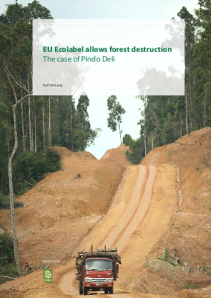Why are scientists researching this dangerous, untested false solution to climate change, when other real solutions already exist?
By Chris Lang. Published in WRM Bulletin 127, February 2008.
Late last year, the Flanders Institute for Biotechnology (VIB), a life sciences research institution applied for permission to establish a field trial of genetically modified poplar trees in Belgium. The GM trees would have modified lignin content, aimed at making production of ethanol easier.[1]
VIB was established in 1996. Funded largely by the Flemish government, it employs more than one thousand scientists. VIB aims to produce scientific discoveries with “industrial application potential”, which it patents and either signs agreements with existing companies or establishes start-up companies to develop the discoveries into “market-ready products”. By 2006, VIB had patents on 100 of its discoveries.[2]
VIB has a communications team responsible for producing information targeted at educators, journalists and politicians. It sets up competitions for schools, provides teaching materials, books, presentations and exhibitions. Materials include titles like “What is bioengineering?”, “The Safety of Genetically Engineered Crops”, and “Xenotransplantation: the animal in the man…”.[3] In these glossy brochures VIB promotes biotechnology, plays down the risks and portrays scientists as neutral experts interested only in the good of society. Meanwhile, VIB lobbies politicians to relax regulations covering the use of human cells and GM crops.
According to the application submitted to the Belgian authorities, VIB plans to plant GM trees on a 0.24 hectare experimental plot in University of Ghent Science and Industry park in Zwijnaarde. The trees are planned to be planted in May 2008 and the experiment is to last until the end of 2014.[4]
The genus Populus includes about 30 species of trees, which are native to most of the Northern Hemisphere, with common names including poplar, aspen and cottonwood. It is the scientists’ favourite tree for genetic experimentation. The world’s first release of genetically modified trees was a field trial of herbicide resistant GM poplars in 1988 in Belgium.[5] Since then, well over half of the 200-plus GM tree trials worldwide involved poplar trees.[6] In 2006, Populus trichocarpa became the first tree to have its full DNA code sequenced.[7]
The only GM trees to be commercially released are poplars – GM poplars have been planted in China since 2002. No records are kept of where the trees are planted or how many have been planted.[8] In 2004, Xue Dayuan of the Nanjing Institute of Environmental Science told the China Daily that genes from the GM poplars had already appeared in natural varieties growing nearby.[9]
The risks of genetic contamination are huge, given the large and widespread population of wild relatives. Poplar trees can spread through suckers growing from roots. Pollen and seed are spread on the wind “possibly on rather long distance”, notes VIB. However, VIB states that, “seed regeneration is not often observed as ecological conditions necessary to seed germination and plantlet development are seldom met.”[10] The words “not often” and “seldom” are hardly reassuring, given that the impact of genetic contamination in non-GM poplar trees is unknown, but potentially devastating.
Yet VIB states that “The environmental impact from the release is expected to be zero, since the GM poplars are not going to flower and any suckers from superficial roots will be destroyed.”[11] True, the trees to be planted will be female clones and will produce no pollen. It is probably also true that if the trees flower, VIB’s researchers will remove the flowers. But the environmental impact of this trial will not be zero.
VIB ignores the fact that the purpose of the trial plantation is to develop GM trees to produce ethanol. To be commercially viable, plantations of GM poplars would need to cover vast areas of land. If large scale GM tree plantations were to be established, genetic contamination of natural varieties of poplars, aspen and cottonwoods would be inevitable.[12]
VIB makes no mention of the impacts that industrial tree plantations have on local communities and their environments. Nor does VIB consider the fact that growing trees (or any other type of agrofuel crop) to produce ethanol on an industrial scale will increase conflicts over land. If forests and grasslands are not to be destroyed (which would release huge amounts of carbon) the tree plantations will have to be planted on agricultural land. This will increase the price of food encouraging corporations and farmers to clear land elsewhere (including forests and grasslands).[13] Two recent papers in Science magazine demonstrate that all the major agrofuels cause more greenhouse gas emissions than conventional fuels, once the emissions caused by land clearance and producing the fuels are taken into account.[14]
The people promoting agrofuels and GM trees as a solution to climate change tend to be scientists whose research benefits from promoting agrofuels or GM trees. “Biomass represents an abundant carbon-neutral renewable resource for the production of bioenergy and biomaterials, and its enhanced use would address several societal needs,” claims an article published in Science magazine in January 2006.[15] What’s missing from such statements is a comparison of agrofuels with, say, large scale solar and wind power combined with high voltage direct current cables and hydrogen fuel cells.[16] These technologies can be used immediately and would massively reduce greenhouse gas emissions. Unlike GM trees.
References
[1] “Summary Notification Information Format“, VIB.
[2] “2007 Annual Report“, VIB.
[3] The brochures are available on VIB’s website.
[4] “Summary Notification Information Format“, VIB.
[5] Rachel Asante Owusu (1999) GM technology in the forest sector: A scoping study for WWF, Worldwide Fund for Nature UK, November 1999.
[6] Sofía Valenzuela, Claudio Balocchi and Jaime Rodríguez (2006) “Transgenic trees and forestry biosafety“, Electronic Journal of Biotechnology, page 337, Vol.9, No. 3, DOI: 10.2225/vol9-issue3-22.
[7] G. A. Tuskan et al (2006) “The Genome of Black Cottonwood, Populus trichocarpa (Torr. & Gray)“, Science 15 September 2006, Vol. 313. no. 5793, pp. 1596 – 1604, DOI: 10.1126/science.1128691.
[8] Chris Lang (2004) “China: Genetically modified madness“, World Rainforest Movement 85, August 2004.
[9] Fred Pearce (2004) “China’s GM trees get lost in bureaucracy“, New Scientist, 20 September 2004.
[10] “Summary Notification Information Format“, VIB.
[11] “Summary Notification Information Format“, VIB.
[12] There is no global monitoring system of GMOs. In 2005, GeneWatch UK and Greenpeace International set up a website, the “GM Contamination Register“, recording publicly documented cases of GM contamination. In 2007, they reported 28 cases of contamination and 11 cases of illegal release of GMOs.
[13] See George Monbiot (2008) “The Last Straw“, The Guardian, 12 February 2008.
[14] Timothy Searchinger, Ralph Heimlich, R. A. Houghton, Fengxia Dong, Amani Elobeid, Jacinto Fabiosa, Simla Tokgoz, Dermot Hayes and Tun-Hsiang Yu (2008) Use of U.S. Croplands for Biofuels Increases Greenhouse Gases Through Emissions from Land Use Change“, Science, 7th February 2008, Vol. 319. no. 5867, pp. 1238 – 1240, DOI 10.1126/science.1151861.
Joseph Fargione, Jason Hill, David Tilman, Stephen Polasky and Peter Hawthorne (2008) “Land Clearing and the Biofuel Carbon Debt“, Science, 7th February 2008, DOI 10.1126/science.1152747.
[15] Arthur J. Ragauskas, Charlotte K. Williams, Brian H. Davison, George Britovsek, John Cairney, Charles A. Eckert, William J. Frederick, Jr., Jason P. Hallett, David J. Leak, Charles L. Liotta, Jonathan R. Mielenz, Richard Murphy, Richard Templer and Timothy Tschaplinski (2006) “The Path Forward for Biofuels and Biomaterials“, Science, 27 January 2006, Vol. 311. no. 5760, pp. 484 – 489, DOI: 10.1126/science.1114736.
[16] George Monbiot discusses these possibilities in his 2006 book, “Heat. How to stop the planet burning”, Penguin/Allen Lane, page 104-105 and in “A sudden change of state“, The Guardian, 3 July 2007.










sir,ple send biref details cultivation for gm trees in india.plant seeds and consultancy
Hi, thanks for your comment. I’m afraid I don’t have any information about GM trees in India.
Could you please explain a little bit about the Thandai Periyar Human Rights Federation? Are you working on GMOs?
Thanks and cheers, Chris
Incredible but true.
The good news was, that this week two Belgian secretaries prohibited the use of GEtrees in Ghent. The bad news is, that immediately the majority of flemish secretaries made this into a political row because the two federal secretaries, magnette and onkelinckx, are frenchspeaking, and so the flemish politicians see this as a evil frenchspeaking scam to ‘boycot flemish environment innovation’.
Sad, but true.
You can find all information on the following link, but unfortunately, it is all in dutch for the moment:
http://ovl.indymedia.org/news/2008/05/23196.php
Thanks Steven. Here’s a rough translation of Greenpeace Belgium’s 27 May 2008 press release:
Hallo Chris,
Nu wil VIB deze gentech bomen in Zeeland, Nederland planten. Wat kunnen wij hier tegen doen? Heb je bovenstaande tekst ook in het Nederlands en mogen wij die gebruiken voor ons komende bezwaarschrift?
Vriendelijke groet,
Miep Bos, woordvoerster van De Gentechvrije Burgers
Nederland
http://greenbio.checkbiotech.org/news/belgiums_council_state_suspends_refusal_vibs_gm_poplar_field_trial
*GHENT, Belgium – The Council of State has consigned the federal ministers Magnette and Onkelinx’ decision to refuse a permit for a field trial with genetically modified poplars to the wastepaper basket. These poplars are intended for the sustainable production of biofuels. The Council of State rules that the refusal causes severe damage to VIB as an institute, and that the arguments used are not legal. The refusal has now been suspended, awaiting a verdict to all intents and purposes.
*
In its fight against the wrong suffered, VIB feels very much reinforced by the ruling of the Council of State, Belgium’s highest juridical court. However, this does not mean that the modified poplars can now be moved to the field. The suspension of the decision is an important step in the legal battle. VIB reckons that the next step will indeed be the nullification of the refusal. The ministers then will be forced to come up with a new decision, taking into account the Council of State’s verdicts.
The concerned poplars possess a modified wood composition, which makes them more suitable for the production of bio-ethanol. Bio-ethanol can play an important role in the battle against climate warming. When they are grown in a greenhouse, they yield up to 50% more bio-ethanol than non-modified poplars. VIB requested a permit for a field trial, but this request was denied. The field trial, however, is necessary to investigate whether the poplars, when cultivated in realistic practical circumstances – exposed to the seasons, weather and wind, insects and plagues, a genuine soil – will also yield wood that can be converted more easily into bio-ethanol. VIB has an international reputation to defend in this field of research. At the exact time the field trial was blocked by the Belgian ministers, VIB received 1.6 million dollars from the American Global Climate and Energy Project, managed by Stanford University, for further research.
*Arguments rebutted*
The ministers had used three arguments for their refusal. First: the file contains no specific assessment protocol for the effect on microbes in the ground, and for the risks of the poplars reacting strangely to diseases and climate stress. The Council of State replies that the experts of the Biosafety Council explicitly have stated to have enough data to assess the riscs involved. Secundly, the ministers argue that in the development of the trees, a ‘marker gene’ is introduced for resistance against an antibiotic. This would be an infringement of the legal requirement to extinguish the use of such genes by the end of 2008. Here too, the Council of State follows the Biosafety Council, which explicitly said that the gene involved poses no risk to public health nor environment. Thirdly, the ministers stated they could not grant permission while there is a public discussion on the relevance of biofuels. This argument has nothing to do with safety, replies the Council of State.
The Council of State adds that the refusal of the filed tests “can endanger the further financing and even existence of VIB”, that the investment in ten years of top research “treatens to become nullified”, and that the refusal of the field test can have negative consequences for the Belgian biotech-sector and for the investments in that sector.
*Flemish Poplars Abroad*
In the mean time, in spite of the Council of State’s ruling, VIB still does not have a permit for the field trial. Already a whole year has been lost. Nevertheless, VIB would like to ensure that the trial is launched for the 2009 growth season. More than anything, it would like to do so in Flanders, close to the related research centre, as was originally planned. This, however, requires the ministers’ willingness to come round and revert their decision.
VIB’s minister of tutelage, Patricia Ceysens, Minister of Science and of Economical Affairs, has ordered to avoid the research being wasted. VIB has, by way of guarantee, started off on two alternative paths. Recently, VIB has also filed a permit request for the field trial in the Netherlands. It already got a positive advice of the Dutch Commission on Genetic Modification, and is following its normal administrative course. When this request will be granted – and VIB cannot think of any reason why this should not be the case – it will again demonstrate the controversial nature of the Belgian decision to deny such a permit. In the meantime, the trees VIB had cultivated for the 2008 growth season have already been placed in open air in Germany. In Germany, there was visibly no problem whatsoever with putting the trees outside. Evidently, strict safety procedures have been followed, as these would have been followed in Flanders.
*BACKGROUND*
VIB has put up a website with an extensive background file on the matter. There, you can find more information on biotechnology, biofuels, genetically modified poplars, legislation on genetically modified plants, as well as on the chronology of the poplar file’s calvary up till now. http://www.vib.be/poplar
Wout Boerjan is leading the research on the molecularly improved poplars. He is head of the research group Bio-Energy in the VIB Department of Plants Systems Biology, UGent – which is managed by Dirk Inzé.
VIB is a not-for-profit research institute conducting pioneering research in the life sciences. About 1100 scientists and technicians carry out fundamental research into the molecular mechanisms that see to the functioning of the human body, plants, and micro-organisms.
Thanks to a close partnership with the four Flemish universities of Ghent, Louvain, Antwerp and Brussels, and a solid investment program, VIB unites the forces of 65 research groups into one institute. The goal of their research is to push out the frontiers of our knowledge in a fundamental way. Through its technology transfer activities, VIB aims to convert research results in products that benefit consumer and patient. VIB develops and distributes a broad range of scientifically sound information about all aspects of biotechnology. For more information, please visit http://www.vib.be .
*For more information, please contact*:
VIB Communication
+32 9 244 66 11
Source: VIB